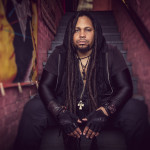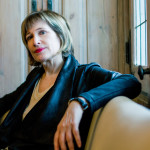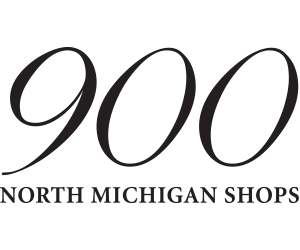Interview by Leor Galil
Photos by Bill Whitmire
My dad is a musician, but in general my whole family is obsessive music people. My stepdad is one of the great record collectors of all time, and it’s certainly where I get a lot of my dance-music stuff. I can remember my stepdad making my mom mixtapes when they were dating, which is really sweet. And we still have all of ’em.
DJing was a natural outgrowth of a really early connection that I felt with dance music, even in Kentucky, which is where I’m from. I followed that to Chicago. Slowly worked my way towards Smart Bar, which is where I really, really wanted to work right off the bat, but it took me almost ten years. Eventually started there as the assistant to the buyer, then I became the talent buyer there.
My first rave was in ’92, so I’ve been going to parties for a long time, but I didn’t start DJing till halfway through college. I did a radio show and was futzing around with some records on the air and accidentally mixed two together. My eyes got big. I became so completely obsessed. There was a period where I was playing—during spring break, when the radio station was closed—12 hours a day. I had the keys and I could go in and there was nobody there. I was really a big dancer, and I used to do B-girl stuff when I was younger. DJing satisfied a piece of that but was so much deeper.
“People imagine DJing to be just champagne and high-fives. The truth is that’s about 5 percent of it. The other 95 percent of it is very lonely.”
When touring became something that it was clear was eating my life, I went to Joe [Shanahan, Metro and Smart Bar owner] and said, “I can’t be flying out on Thursday night and coming back on Monday morning for the staff meeting anymore. I’m gonna freak out.” I thought I was gonna have to quit this job that I loved, I was really about to cry, and Joe was a little broken up. Then he got this look on his face. If you know Shanahan—when he realizes something, there’s this kind of, like, Shanahan aha face. He goes, “Wait, we’re not breaking up. . . . We’ll make a new job.” That’s when the music director position was created.
People imagine DJing to be just champagne and high-fives. The truth is that’s about 5 percent of it. The other 95 percent of it is very lonely. A lot of it is things that people hate, like airports. Sometimes you can go three or four days where you only get a couple hours of sleep, especially during festival season. The emotional component of that is very challenging, because I’m married. I have a house and a dog and all that normal stuff—I’m not a party animal. So I feel a lot of separation anxiety.
Obviously I wouldn’t do this if music had not been the driving force in my life since I was a child. But there’s more than that. You are your own business, and that freedom is both delicious and terrifying. I love to travel. Before I got my first European offer I didn’t have a passport, and I had only been out of the country to go to Canada and the Caribbean. Now I’ve been everywhere from Istanbul to Japan, Australia, all over Europe. I really enjoy the education that comes with being a world citizen.
For many women who are just getting their feet wet, some of the things that I stand for and have said have been meaningful. I definitely do feel a certain amount of responsibility, because women are still fighting to get into this industry, and once they get in it they face a whole set of challenges.
There was a thing that I said in an interview, off the cuff—this thing that they call the Black Madonna Manifesto. Just a little piece of an interview that starts off “Dance music needs Riot Grrrls, dance music needs . . . ,” all this list of things. It started getting circulated, and I would see it on Tumblr. I really knew that there was momentum when I saw somebody had handwritten it on a sign that they unfolded at a festival I was playing in the UK. Now there’s a regular conference that takes its name from [the manifesto] called Salt + Sass. There are printed posters for it in Switzerland. Someone was needlepointing it.
Girls come in crying in clubs, telling me their personal stories of what happened to them or had happened to their women peers in the industry. I’ve had big women DJs write me in private saying, “I want to start talking about these things, and I want to talk to you about it first.” These ideas existed way before me, and the people who really fight these fights are women of color and trans people. There’s nothing that I’m talking about that a woman of color who’s a feminist didn’t talk about first 30 years ago. Having said that, there definitely has been momentum around these issues just in the last couple of years. I’m one piece of that puzzle, but I take that piece very seriously.
The main thing is to be a microphone that shouts the name of other women. The most important thing that I can do is use anything good that happens to me to make sure the door widens. Some of that has happened at Smart Bar with the [women-focused] Daphne series, some of it has happened when people ask me “Who should we book next?” I’m starting to get offers to curate in larger venues and events. Do you choose the person that everybody already knows, or do you choose the person that might be overlooked by a genre of music that has recently emphasized primarily rich white men?
I’ve been a DJ for almost 16 years, and I didn’t play my first out-of-country show until two years ago. I went through a period where I never got booked in Chicago, where I would play two or three times a year, and that was real thrilling.
The first things that I made I couldn’t get anybody to listen to. Things sat on my Soundcloud forever. My first few records had like a hundred plays on Soundcloud, 95 of which were probably ’bots, the other five of which were my mom. Producing was the thing that eventually opened the door for me.
From producing I met Steve Mizek, who now runs the Northside 82 label; he also ran the venerable Little White Earbuds blog. My friend Jason Garden, who is now the talent buyer at Smart Bar, insisted that I show the first five or six records that I made to Steve, who had started his first label, and I was so afraid to. I sent them to Steve and he didn’t say anything for a long time. One day he was like, “Hey, I want you to come over to my house,” and I was totally afraid. We listened to everything I had made and decided to put out the two original disco cuts that I had made.
Slowly that first round of tracks got picked up. I did a Little White Earbuds mix, and that changed a lot. When Steve gives you the green light, other people pay attention. It’s how I got my European agent. My first confirmed show in Europe was Panorama Bar, and everything changed. The whole joke about the 20-year overnight sensation—that’s me. v




